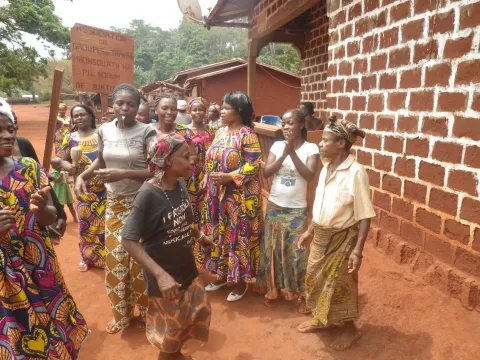Share the page
African civil society’s involvement in Nature Conservation: the newly-launched website of the Small-scale Initiatives Programme celebrates local African organisations

Paris, 11 March 2021 – Six months ahead of the IUCN’s World Conservation Congress, to be held in Marseille in September 2021, the Small-scale Initiatives Programme (PPI), run by the IUCN’s French National Committee and financed since 2007 by the French Facility for Global Environment (FFEM), is showcasing projects run by African nature conservation organisations on a new website (www.programmeppi.org).
- INCREASING THE VISIBILITY OF AFRICAN CIVIL SOCIETY ORGANISATIONS (CSO) COMMITTED TO BIODIVERSITY CONSERVATION
The website lists the programme’s latest news but also the 245 projects supported since 2007 in sub-Saharan Africa involving specific actions under various themes, for example resolving human-animal conflicts and creating community protected areas. There are news articles from the PPI as well as a section on forthcoming calls for projects and selection processes.
For Nicolas Salaün, Policy Officer at the IUCN’s French National International Cooperation Committee, “This site complements the PPI perfectly. It aims to encourage the emergence of African organisations and to increase their visibility. Also, as most of our partners don’t have a website, it gives them a page where they can present their organisation and the many conservation projects they're running.”
Indeed, the 190 organisations benefitting from the PPI each have a dedicated page which they can update whenever they wish.
Stephen Kankam from Ghanaian PPI beneficiary NGO Hen Mpoano explained that “today, communicating about what we do is essential to making us known, particularly to funding partners who can support us in encouraging biodiversity and developing local populations.”
The objective is to enhance PPI beneficiaries’ presence and standing in the eyes of political decision-makers and funding partners by highlighting the PPI’s results and showing that associations can provide solutions to environmental challenges across Africa.
- DIGITAL TECHNOLOGY SERVING THE PPI COMMUNITY
The site is complemented by a private-access digital platform offering organisations the opportunity to exchange content (documents, discussion forum, photo library, etc.) and to share information about their projects, enabling everyone to capitalise on best practice. This platform will be particularly useful in strengthening links between organisations which will enable even greater protection of Africa’s exceptional biodiversity.
It will bolster the sense of community among the PPI beneficiaries, providing all partners with the data and tools they need for communication and awareness-raising.
- PPI, A KEY AFRICAN BIODIVERSITY CONSERVATION PROGRAMME
Since 2007, the IUCN’s French National Committee has supported sub-Saharan African CSO active in conserving biodiversity and promoting nature-based solutions, through the Small-scale Initiatives Programme (PPI). Over the last 14 years, the PPI has supported 245 projects run by 190 CSOs in 33 countries, mainly in Central and West Africa.
The programme is financed by the FFEM – the French Facility for Global Environment – and the MAVA Foundation.
About the IUCN (International Union for the Conservation of Nature) French National Committee www.uicn.fr
The IUCN’s French National Committee is a non-governmental organisation containing the second-largest number of IUCN members in the world with two ministries, 13 public bodies, 47 NGOs and over 250 experts. Worldwide, the IUCN includes some 1,300 organisations and 15,000 experts. The IUCN is the only environmental organisation with UN observer status. The IUCN enables its members and experts (biologists, economists, legal specialists, etc.) to collaborate internationally and share their biodiversity-related knowledge and activities. Since its creation in 1948 at Fontainebleau the IUCN has made 1,300 biodiversity-conservation-related recommendations and helped to structure and reinforce international action in the field. Every four years it organises the World Conservation Congress and the next edition is to be held in Marseille in 2021.
More about the French Facility for Global Environment (FFEM) www.ffem.fr/en
The French Facility for Global Environment (FFEM) supports innovative environmental projects in developing countries. It was established in 1994 by the French government after the first Earth Summit and to date has funded 333 projects in more than 120 countries, two-thirds of them in Africa.
The FFEM works in partnership with the public and private sectors and civil society in both the North and the South. It also works closely with other donors and international organisations. The projects it finances generate environmental, social and economic benefits for local populations. They help protect biodiversity, the climate, international waters, land and the ozone layer and combat chemical pollution. The FFEM has an unusual approach that involves supporting pilot projects to learn lessons from them and disseminate their innovations on a larger scale.
More about the MAVA foundation www.mava-foundation.org
MAVA was born of the passion, vision and enterprise of one man, Dr. Luc Hoffmann. Created in 1994 to support the conservation of iconic sites such as the Camargue (France) and Doñana (Spain), MAVA gradually became a professional foundation and a key global conservation funder. Today, the foundation is headed by Dr. Hoffmann’s children (his son André is the Chairman) and its annual budget of around CHF70m is allocated to projects run by various partners.
MAVA’s mission is to conserve biodiversity for the benefit of people and nature by funding, mobilising and strengthening its partners and the conservation community. The Foundation’s activities are focused on four themed programmes covering the Mediterranean, West Africa, Switzerland and the Sustainable Economy.
The MAVA Foundation is undertaking its last phase of activity and has entered a transition period: it plans to cease funding in 2022.
FFEM COMMUNICATIONS CONTACT
Delphine Donger Head of communications
+33 (0)6 22 70 05 65
dongerd@afd.fr
Vidéo présentation PPI
Watch the video presentation of the PPI:
